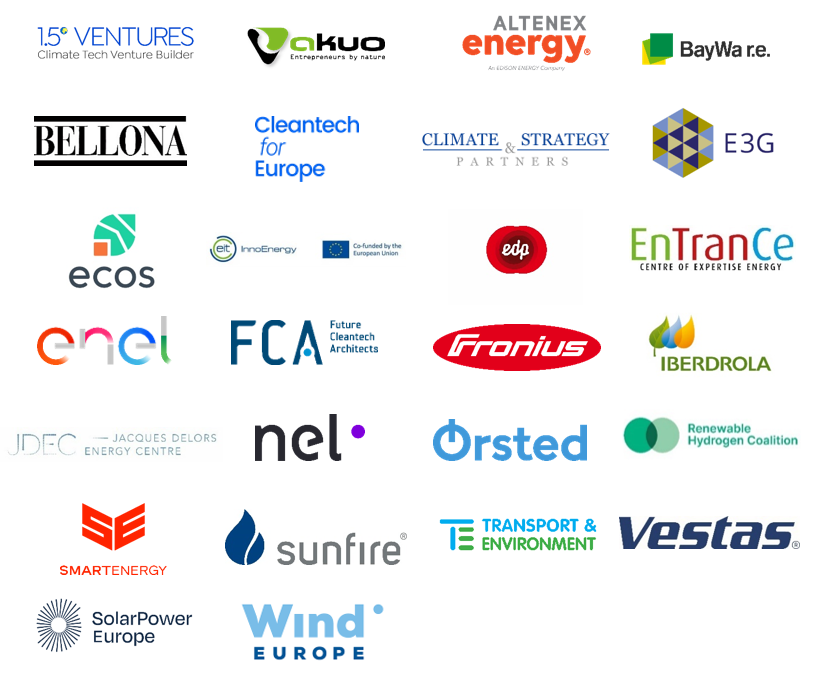Leading the way
Ambitious binding renewable hydrogen targets in priority sectors are key for Europe’s energy security and to become global leader
Following the European Commission’s REPowerEU communication released this Tuesday, the signatories of this letter call on EU policymakers to keep the Renewable Energy Directive for renewable hydrogen only and maintain the ambition proposed by the European Commission for renewable hydrogen and derived e-fuels uptake in priority sectors.

Ambitious binding renewable hydrogen targets in priority sectors are key for Europe’s energy security and to become global leader
Following the European Commission’s REPowerEU communication released this Tuesday, the signatories of this letter call on EU policymakers to keep the Renewable Energy Directive for renewable hydrogen only and maintain the ambition proposed by the European Commission for renewable hydrogen and derived e-fuels uptake in priority sectors. Such focus is key to upscale demand and create a European market for renewable hydrogen, the only truly sustainable and competitive solution. This will also stimulate innovation, create the jobs of the future, and strengthen Europe’s energy security, autonomy in strategic value chains and resilience.
As EU Member States and the European Parliament prepare their positions, we highlight the benefits of adopting ambitious binding renewable hydrogen and derived e-fuels targets in priority sectors such as industry and transport, notably aviation and shipping, which have no other viable decarbonisation alternative:
- Send a strong market signal and drive investment in renewable hydrogen. This will accelerate private investment, reduce the cost of technology through mass deployment and support the upstream value chain development with the associated job creation. Recent studies show that important potential demand for renewable hydrogen exists[1] and major investments have been announced in key industrial sectors such as steel. These could be unlocked in the near-term with a strong regulatory signal.
- Secure first mover advantage in Europe and boost the resilience and competitiveness of European industry. Clear renewable hydrogen and derived e-fuels targets will support the creation of innovative automated electrolyser manufacturing in Europe, which will be key to achieve economies of scales, maintain technological edge and outweigh growing non-European competition with relatively cheap labour costs[2]. This will also accelerate the ongoing industrial revolution in Europe towards zero-emission manufacturing, disrupting the status-quo on a global scale, and securing leadership positions in the markets of the future.
- Serve as basis to set associated national support schemes to unlock private investment and help first European movers to deliver these targets at least cost. De-risking projects and bringing down the ‘green premium’ of renewable hydrogen remain key challenges. Industrial and energy frontrunners are ready to invest based on a clear, supportive framework that helps close the cost gap of renewable hydrogen until it reaches cost parity with polluting fossil-based alternatives.
Overall it will be crucial to keep the Commission’s proposed targets to renewable hydrogen, maintain ambition, binding and focused on these sectors that already consume hydrogen or are hard-to-electrify and have no other decarbonisation alternatives. This will ensure efficient use of limited hydrogen volumes in this early phase and avoid creating demand in sectors where more efficient decarbonisation solutions are available. Fostering pure renewable hydrogen applications and avoiding blending with natural gas throughout the economy will also help ensure the most optimal use of this highly valuable resource and maximise its decarbonisation potential across our economy.
Supporting high ambition in renewable hydrogen and derived e-fuels is a strategic political choice for Europe. More than ever Europe needs to improve its energy security. This calls to massively expand renewable energy deployment to reduce its dependence on natural gas imports. Facilitating the availability of additional renewable electricity to enable the rapid scale up of renewable hydrogen production is also crucial. Solving the permitting bottleneck urgently will be key for renewables and renewable hydrogen to become clear alternatives to natural gas. This is the key role that the Renewable Energy Directive should play – promote renewable energy – and why it cannot be open to fossil low-carbon hydrogen.
Europe must act now with ambition to turn a unique opportunity into a true success story of the European Green Deal. This will not only help Europe become the global leader in renewable hydrogen and achieve the green transition of its economy, it will also strengthen its competitiveness, security of strategic supply chains and resilience as well as create economic benefits and jobs for the generations to come.
We call on stakeholders and policymakers to join and support this call.


